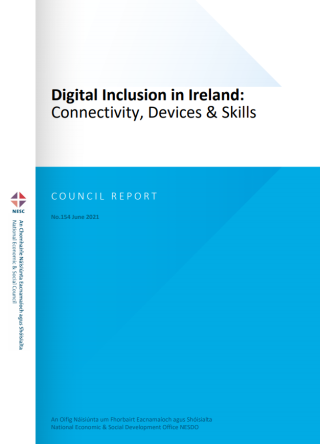Digital Inclusion In Ireland

The latest NESC report, Digital Inclusion in Ireland: Connectivity, Devices & Skills, focuses on Digital Inclusion - what it is and why it's important. This Report provides key information for policymakers as we consider the world of work, education and social inclusion in an increasingly digital age.
The Report, which will officially be launched on the 1st July 2021 (see www.nesc.ie for details), is timely as we begin to emerge from a pandemic which saw a dramatic increase in remote working and learning, and uses national and international data to inform policy for the future. Greater digital inclusion is also needed to ensure that "Ireland’s households, businesses and public sector are prepared for a just transition towards the ‘Fourth Industrial Revolution’, as ICT changes the shape of enterprise, employment and living conditions.".
Among the key dimensions of digital inclusion are connectivity, access to devices, skills, and the confidence to engage with ICT. On the dimensions the Report states:
Connectivity
In Ireland, broadband connection rates and speeds are below average for households, businesses and farms in the Border, Midland and Western areas, for those in lower-income quintiles, and for those depending on welfare payments. In some areas, no broadband is available.
Access to Devices
Irish people on low incomes are more likely to own older and second-hand devices, to have internet access only on their smartphone, and to have limits on the amount of data they can use. Those with higher incomes are more likely to have broadband, and access to the internet on a range of devices including smartphones, laptops and desktops. These devices are much easier to use for employment or training. Finance is also a barrier to adoption of new technologies for Irish businesses and farms.
Skills Gaps
An important issue when it comes to skills gaps is the pace of change in ICT. Digital competency requires continuous learning. As well as the technical skills of being able to use devices, ICT users also need to be able to evaluate the accuracy and trustworthiness of online resources. In Ireland, skills are lower among older people, and those on lower incomes.
Confidence
Challenges are also encountered by those with poor literacy. In business and farming, smaller set-ups with owners or managers who are older tend to lag in ICT skills, and to find it difficult to compete for staff with good IT skills. This further affects their adoption of new technologies. There is an interplay between lack of skills, lack of motivation and poor use of ICT, both internationally and in Ireland.
Policy Recommendations
Among the Council sets out five overarching recommendations to ensure that the gaps identified are closed:
- Develop a national strategy for digital inclusion, with a key focus on co-ordination, and with a strong commitment to fine-grained measurement of progress.
- Create a comprehensive framework for digital skills progression.
- Support digital inclusion at community level.
- Deliver targeted supports for material access to key groups.
- Enhance guidance for digital and assisted-digital public services, and ‘complementary’ channels.
More than a decade ago, the European Commission recognised that ‘Digital literacy is increasingly becoming an essential life competence and the inability to access or use ICT has effectively become a barrier to social integration and personal development. Those without sufficient ICT skills are disadvantaged in the labour market and have less access to information to empower themselves as consumer, or as citizens saving time and money in offline activities and using online public services’[1]. Over ten years later, there are still areas in (particularly rural) Ireland who continue to be disadvantaged in this way, with the digital divide further exacerbating educational disadvantage in areas with poor connectivity.
In our Socio-economic Review, Social Justice Matters: a 2021 guide to a fairer Irish society, Social Justice Ireland also called on Government to (Chapter 9):
- Ensure connectivity to affordable high speed broadband access right across the country.
- Develop programmes to enable all internet users to critically analyse information and to become “savvy, safe surfers” and a grants scheme to support low income and vulnerable households to purchase ICT equipment needed to access public services on implementation of the National Digital Strategy.
[1] European Commission (2008): Annual Information Society Report 2008 Benchmarking i2010: Progress and Fragmentation in the European Information. European Commission: Brussels.